Filter by
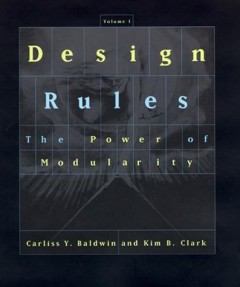
Design Rules: The Power of Modularity
We live in a dynamic economic and commerical world, surrounded by objects of remarkable complexity and power. In many industries, changes in products and technologies have brought with them new kinds of firms and forms of organization. We are discovering news ways of structuring work, of bringing buyers and sellers together, and of creating and using market information. Although our fast-moving…
- Edition
- -
- ISBN/ISSN
- 9780262267649
- Collation
- 1 online resource (volumes ) :illustrations
- Series Title
- -
- Call Number
- -

Subversion, conversion, development : cross-cultural knowledge exchange and t…
This volume explores alternative cultural encounters with and around information technologies, encounters that counter dominant, Western-oriented notions of media consumption. The contributors include media practices as forms of cultural resistance and subversion, 'DIY cultures', and other non-mainstream models of technology production and consumption. The contributors - leading thinkers in sci…
- Edition
- -
- ISBN/ISSN
- 9780262322492
- Collation
- 1 online resource (266 pages).
- Series Title
- -
- Call Number
- -
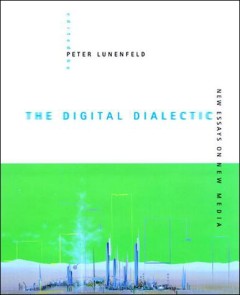
The digital dialectic: new essays on new media
The Digital Diolectic is an interdisciplinary jam session about our visual and intellectual cultures as the computer recodes technologies, media, and art forms. Unlike purely academic texts on new media, the book includes contributions by scholars, artists, and entrepreneurs, who combine theoretical investigations with hands-on analysis of the possibilities (and limitations) of new technology. …
- Edition
- -
- ISBN/ISSN
- 9780262278645
- Collation
- 1 online resource (xxi, 298 pages) :illustrations.
- Series Title
- -
- Call Number
- -
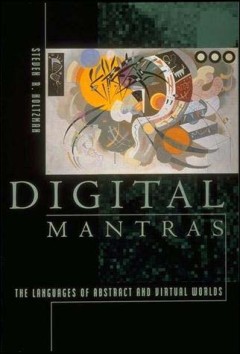
Digital mantras: the languages of abstract and virtual worlds
Holtzman synthesizes ideas from music, computing, art, and philosophy with biographical and historical anecdotes and a thread of mysticism to arrive at a new philosophy of creativity for the digital age.
- Edition
- -
- ISBN/ISSN
- 0262291169
- Collation
- 1 online resource (x, 321 pages) :illustrations (some color)
- Series Title
- -
- Call Number
- -
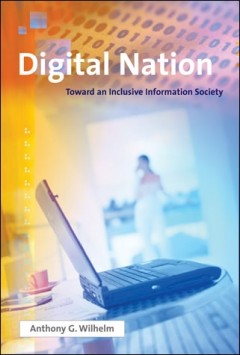
Digital Nation: Toward an Inclusive Information Society
The long-term social benefits of building an inclusive information society: a national action plan.As our social institutions migrate into cyberspace, the digitally disenfranchised face increasing hardships. What happens when--in search of quick and cheap fixes--a government office shuts down and is replaced by a public Web site? What happens when a company accepts only online job applications?…
- Edition
- -
- ISBN/ISSN
- 9780262286213
- Collation
- -
- Series Title
- -
- Call Number
- -
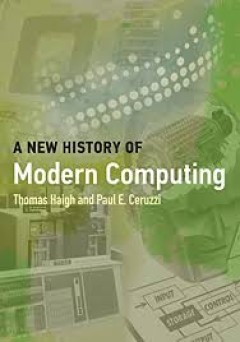
A New History of Modern Computing
"Bringing the history of modern computing fully up to date, from new applications to scientific computation to video games and the ubiquitous smartphone"--OCLC-licensed vendor bibliographic record.
- Edition
- -
- ISBN/ISSN
- 0262366487
- Collation
- 1 online resource.
- Series Title
- -
- Call Number
- -

Philosophy and AI :essays at the interface
"A Bradford book."OCLC-licensed vendor bibliographic record.
- Edition
- -
- ISBN/ISSN
- 9780262315951
- Collation
- 1 online resource (xi, 304 pages) :illustrations
- Series Title
- -
- Call Number
- -
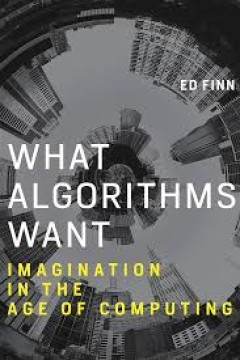
What algorithms want imagination in the age of computing
The gap between theoretical ideas and messy reality, as seen in Neal Stephenson, Adam Smith, and Star Trek.OCLC-licensed vendor bibliographic record.
- Edition
- -
- ISBN/ISSN
- 9780262338837
- Collation
- 1 online resource (viii, 257 pages) :illustrations.
- Series Title
- -
- Call Number
- -
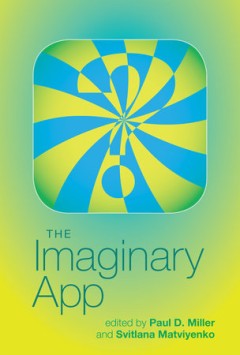
The imaginary app
The mobile app as technique and imaginary tool, offering a shortcut to instantaneous connection and entertainment.OCLC-licensed vendor bibliographic record.
- Edition
- -
- ISBN/ISSN
- 9780262320795
- Collation
- 1 online resource (xxxvi, 279 pages, 12 unnumbered pages of plates) :illustrations (some color).
- Series Title
- -
- Call Number
- -
Portraits in silicon
Short biographies of: Charles Babbage, Alan Turing, John von Neumann, Claude Shannon, Konrad Zuse, John V. Atanasoff, John V. Mauchly, J. Presper Eckert, Howard Aiken, Jay W. Forrester, Thomas J. Watson, Sr., William Norris, H. Ross Perot, William Shockley, Robert Noyce, Jack Kilby, Marcian E. (Ted) Hoff, Gene Amdahl, Seymour Cray, Gordon Bell, Grace Murray Hopper, John Backus, John Kemeny, Tho…
- Edition
- -
- ISBN/ISSN
- 9780262291422
- Collation
- 1 online resource (xiv, 374 pages) :illustrations, portraits
- Series Title
- -
- Call Number
- -
 Computer Science, Information & General Works
Computer Science, Information & General Works  Philosophy & Psychology
Philosophy & Psychology  Religion
Religion  Social Sciences
Social Sciences  Language
Language  Pure Science
Pure Science  Applied Sciences
Applied Sciences  Art & Recreation
Art & Recreation  Literature
Literature  History & Geography
History & Geography